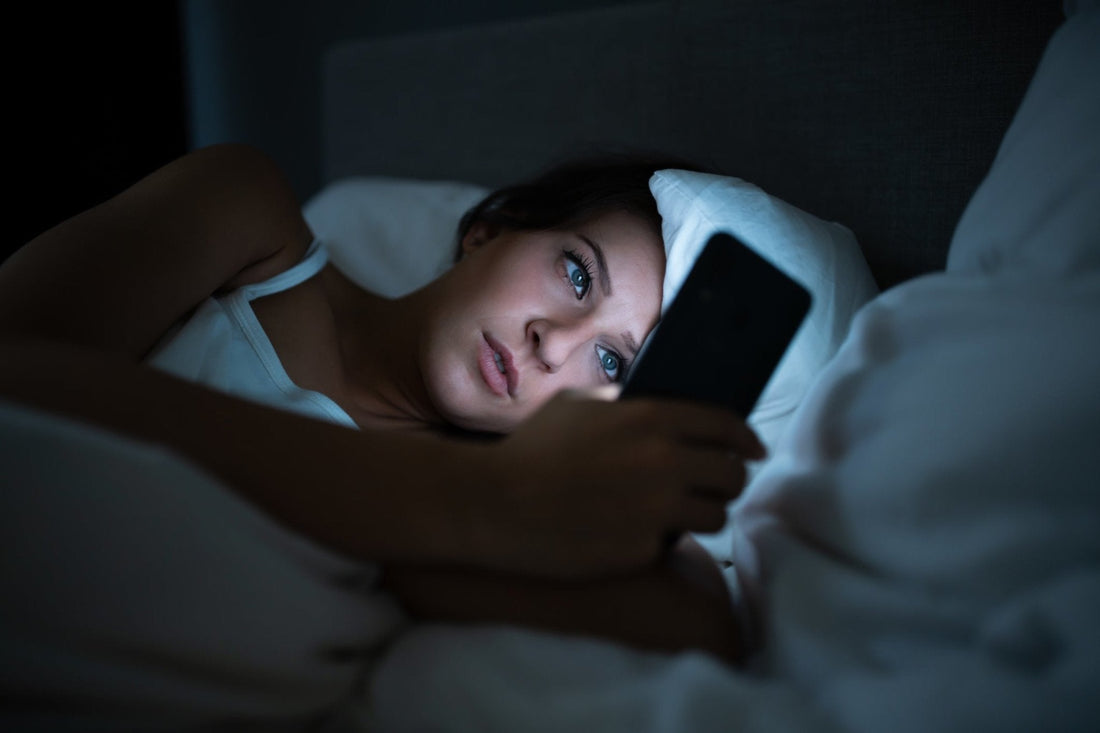
10 Tips for Better Sleep and More Vibrant Skin.

10 Tips for Better Sleep and More Vibrant Skin
Beauty Sleep does matter! "Beauty Sleep" is a common phrase that initially referred to sleep that is taken before midnight and is assumed to keep one looking healthy and attractive. I take this seriously. I haven't been awake on purpose after midnight in years. Not even on New Year's Eve.
Lack of sleep is a significant issue in society today, causing many people to suffer from health problems related to sleep deprivation. Most of us recognize there is a connection between sleep and overall health. And one of the first places that lack of quality sleep shows up is on our skin.
According to a study in the American Academy of Medicine, sleep deprivation affects facial features such as the eyes, mouth, and skin. Results from this study show that the faces of sleep-deprived individuals were perceived as having more hanging eyelids, redder eyes, more swollen eyes, and darker circles under the eyes. Sleep deprivation also was associated with paler skin, more wrinkles or fine lines, and more droopy corners of the mouth. (Resource 1)
In a study by the Department of Dermatology, Case Medical Center, chronic poor-quality sleep is associated with accelerated intrinsic skin aging and less effective skin barrier function. Good quality sleep is associated with more efficient recovery from UV-induced erythema and better self-perception of overall appearance. (Resource 2)
Why Sleep Matters
Sleep is when some of the most critical internal — and epidermal — recoveries occur! During sleep, your skin's blood flow increases, and the organ rebuilds its collagen and repairs damage from UV exposure, reducing wrinkles and age spots. Poor sleep leads to higher trans epidermal water loss and decreased skin hydration, elasticity, and blood flow.
Getting Better Sleep
For better health and skin, creating a good sleeping environment is essential. Here are some helpful tips from the Better Sleep Foundation and the National Institute of Health.
1. Reduce exposure to light in the evening, particularly artificial blue light. It can help your body naturally prepare for sleep. The most effective way to reduce exposure to blue light in the evening is to turn off the sources. This means dimming or reducing LED and fluorescent lighting and turning off electronic devices after dark. Specialty glasses may also help reduce exposure to blue light. For example, Blue-light blocking or amber glasses can reduce the melatonin-suppressing effects of bright light. Wear these at least 1-1/2 hours before bedtime, and wear them until you are in bed with lights off.

2. Remove electronics from your sleeping area. Using electronic devices at night can interfere with both the quantity and quality of sleep. Sleep experts recommend keeping technology out of the bedroom to counteract this. In addition, technology affects the brain, stimulating your mind and making it harder to fall asleep.
3. Keep the temperature cool and make it dark. As a rule of thumb, sleep psychologist Michelle Drerup, PsyD, Cleveland Clinic, says to keep your bedroom at 60 to 67° F (15 to 19° C) and to think of your bedroom as your 'cave.' This temperature range is believed to help facilitate the stability of REM sleep. (In other words, Doctor’s order… keep it cool!)
4. Try to sleep on your back. According to Konstantin Vasyukevich, MD, a cosmetic doctor and board-certified facial plastic surgeon in New York City, the horizontal position your body takes during sleep shifts the balance of fluid distribution towards the upper body (which is why facial swelling is usually seen early in the morning). "The long-term effects of this continuous cyclical swelling should not be underestimated," says Dr. Vasyukevich. "Daily expansion and contraction of the facial tissue strain the ligamentous support of the face. This eventually leads to stretching and sagging associated with an aged appearance. Although it's the best position for sinus problems, Dr. Vasyukevic warns that side sleeping can lead to wrinkles on your décolletage and the side of your face you lie on.
5. Use Silk or Satin pillowcases. "A huge factor in aging during sleep is the shearing forces created by skin movement against the pillow, according to Dr. Vasyukevis. You might not think this is significant enough to make a real difference in your skin overnight, but multiply this over years of sleeping, and you can imagine how it could accelerate aging on your face. That is not ideal. If you shift to your side at night, try investing in a Silk or Satin pillowcase to prevent skin chafing and minimize these adverse effects. Silk or Satin pillowcases are also better for your hair. (I use pillowcases by Blissy and Slip.)
6. Elevate your head. Elevating your head has been proven to help with snoring, acid reflux, and nasal drip — all issues that can disturb the quality of your sleep and, therefore, your skin. In addition, it can help reduce bags and circles under your eyes by improving blood flow and preventing blood from pooling.
7. Always cleanse skin at night. The skin's surface builds up dead skin cells, oil, bacteria, sweat, and other debris throughout the day. There is also microscopic soot in the air called particulate pollution that settles on the skin during the day that can be damaging, according to Dr. Elizabeth Tanzi, board-certified dermatologist and co-director of the Washington Institute of Dermatologic Surgery. A gentle cleanser without sulfites, such as Vitali's Gentle Exfoliating Cleanser, removes dirt, makeup, and damaged skin cells.

8. Removing eye makeup is an absolute must. There are many glands around the eyelids and eyelashes. Wearing makeup overnight can clog and inflame the delicate glands and skin around the eyes. This can result in red and sometimes puffy eyes. Removing all traces of eye makeup before bed every night is best. (Consider disposable skin wipes to make this easier when you are extra tired. I like Micellar water and throw-away wipes from Clean Skin Club. They are soft and great to use for the delicate eye area.)
9. Apply products with restorative active ingredients. Nighttime is a great time to maximize the results of active ingredients such as Vitali's Skin Cell Restorative Serum with GHK-Cu (Copper Peptides) or retinol. (Be sure to apply the Copper Peptides first and wait 30 minutes before using retinol or alternate nights with the serum and the retinol.)
Nighttime is also when the skin's repair mechanism kicks in. Copper Peptides invigorate aging stem cells promoting natural collagen in the epidermis. Stem cells reproduce mainly at night cells and reduce the appearance of aging. (Resource 3)
10. Moisturize and hydrate your skin. "Skin's oil production peaks at midday, and there is less oil production at night. Therefore, when you lose that protective layer of natural oils, your skin loses more water, so it's important to replenish the water loss with a moisturizer overnight," says Dr. Howard Sobel, NYC. Vitali's Skin Awakening Moisturizer with Copper Peptides not only repairs skin at the cellular level but also has natural ingredients like meadowfoam seed oil that acts as an emollient, sealing in moisture, and jojoba seed oil that provides a lasting layer of moisture for the skin.
For better health and skin, it is important to prioritize sleep. That begins by creating a routine and environment that helps your body prepare for and experience quality sleep.
Nearly everyone has an occasional sleepless night. However, if you often have trouble sleeping, discuss it with your healthcare provider. Identifying and treating any underlying causes can help you get the restorative sleep you need for your health and your skin.
